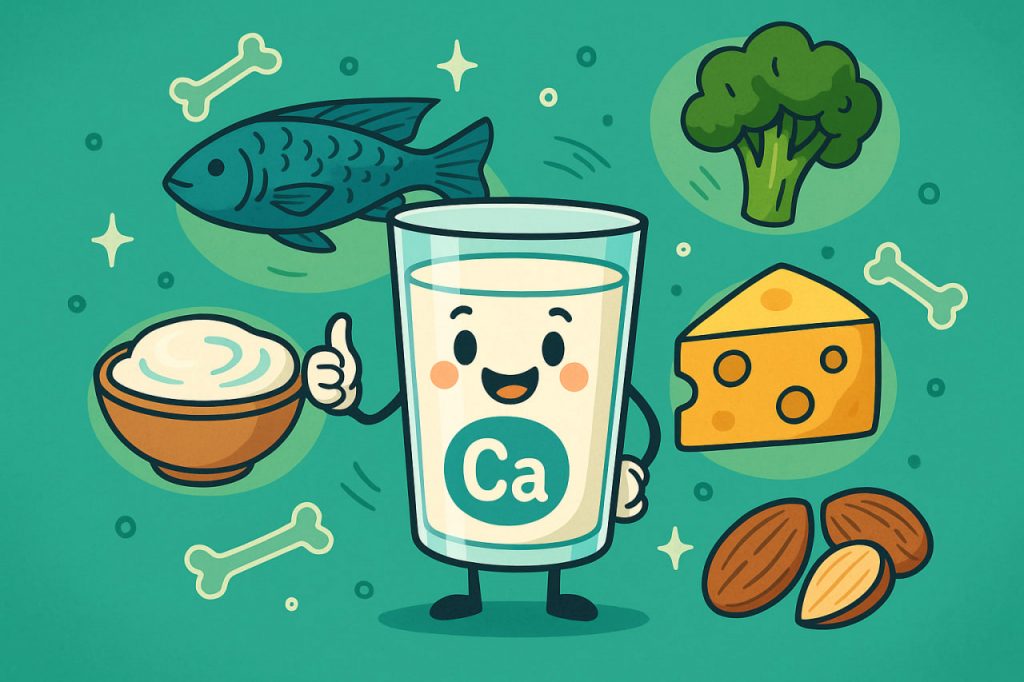Calcium is one of the most important minerals for human health. It is best known for its role in building strong bones and teeth, but its functions go far beyond the skeletal system. Calcium participates in many vital processes, making it essential for overall health and well-being. Since the human body cannot produce calcium on its own, it must be obtained from food or supplements, and a proper balance of intake is critical for health.
Calcium and the Skeletal System
The majority of calcium in the body, about 99%, is stored in bones and teeth. This mineral gives them strength and structure. Throughout life, bones undergo constant renewal, and calcium plays a central role in this process. During childhood and adolescence, when bones are growing, calcium intake is especially important to build maximum bone mass. In adulthood, calcium helps slow down bone loss and reduces the risk of conditions such as osteoporosis.
Calcium and Muscle Function
Calcium is crucial for muscle contraction. When nerves stimulate muscles, calcium is released inside muscle cells, allowing them to contract. After contraction, calcium levels drop, and the muscle relaxes. This process happens in every movement the body makes—from walking and running to the beating of the heart. Without enough calcium, muscles may cramp, weaken, or function improperly.
Calcium and the Nervous System
In the nervous system, calcium plays a role in transmitting signals between nerve cells. Nerve impulses depend on the controlled flow of calcium ions to release neurotransmitters, the chemicals responsible for communication between neurons. This means calcium is directly linked to brain function, reflexes, and coordination.
Calcium and Blood Clotting
One of calcium’s lesser-known but vital roles is in blood clotting. When an injury occurs, calcium works together with proteins to form clots that stop bleeding. Without sufficient calcium, the clotting process would not be efficient, and even small injuries could become dangerous.
Maintaining Calcium Balance
The body regulates calcium levels tightly, as both deficiency and excess can cause health problems. The parathyroid glands help maintain balance by controlling how much calcium is absorbed from food, how much is stored in bones, and how much is excreted. A long-term lack of calcium can weaken bones, while too much calcium may lead to kidney stones or other complications.
Sources of Calcium
Calcium can be found in many foods, such as dairy products (milk, cheese, yogurt), leafy greens (kale, broccoli), nuts and seeds (almonds, sesame), and fish with bones (sardines, salmon). Fortified foods, such as some plant-based milks and cereals, also provide calcium. To properly absorb calcium, the body also needs vitamin D, which regulates its use in bones and other tissues.
Conclusion
Calcium is a vital mineral that supports bones, muscles, the nervous system, and blood clotting. Its presence in the right amounts ensures that the body functions smoothly and remains strong throughout life. Maintaining a balanced diet rich in calcium and vitamin D is the best way to protect long-term health.
Glossary
- Minerals – natural elements essential for human health, such as calcium, iron, and magnesium.
- Bones – the rigid framework of the body that stores most of the calcium.
- Osteoporosis – a disease where bones become fragile due to calcium loss.
- Muscle contraction – the tightening of muscle fibers when activated by nerves.
- Nervous system – the network of nerves and brain cells that control body functions.
- Blood clotting – the process of forming a clot to stop bleeding.
- Parathyroid glands – small glands in the neck that regulate calcium balance.
- Vitamin D – a nutrient that helps the body absorb calcium effectively.


